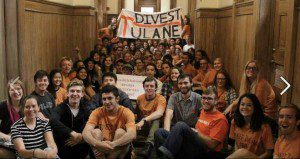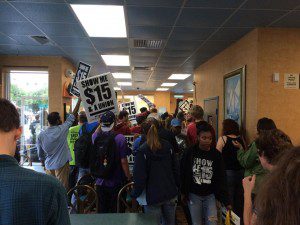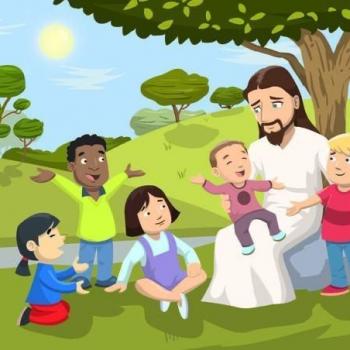 During the past week, I have had the privilege of supporting two different political campaigns, the Fight for $15 movement, which seeks a living wage for fast food workers, and the Divest Tulane movement, which seeks to extract Tulane University from its investments in the fossil fuel industry. On Wednesday night, I marched with Fight for $15 as they shut down an area McDonald’s during dinner time. Throughout the week, I’ve been participating in Divest Tulane’s sit-in in the hallway of Gibson Hall, our university’s administration building. Both campaigns are making demands that are completely ridiculous and unreasonable according to the logic of our market economy. And it is precisely in demanding the impossible that both of these campaigns have given me hope for the future of an impossibly cynical and otherwise doomed world.
During the past week, I have had the privilege of supporting two different political campaigns, the Fight for $15 movement, which seeks a living wage for fast food workers, and the Divest Tulane movement, which seeks to extract Tulane University from its investments in the fossil fuel industry. On Wednesday night, I marched with Fight for $15 as they shut down an area McDonald’s during dinner time. Throughout the week, I’ve been participating in Divest Tulane’s sit-in in the hallway of Gibson Hall, our university’s administration building. Both campaigns are making demands that are completely ridiculous and unreasonable according to the logic of our market economy. And it is precisely in demanding the impossible that both of these campaigns have given me hope for the future of an impossibly cynical and otherwise doomed world.
When I graduated from college 15 years ago, we had a slogan in what was then called the anti-globalization movement: another world is possible. It is a simple but revolutionary concept. The world as it’s currently organized by global capitalism is not the way that things have to be, no matter how emphatically we are told otherwise. Corporations do not have to be people. People do not have to be consumers. The wonders of nature do not have to be commodities whose sole purpose is to make somebody a profit. Our adult lives do not have to be reduced to career advancement and driving our kids back and forth between extra-curricular activities in the suburbs. We can live differently. Another world is possible.
One of the most revolutionary verses in the Christian Bible is James 4:4, which says, “Friendship with the world is enmity with God.” Many Christians misinterpret this verse as a justification for treating the people around us with contempt. But “friendship with the world” does not refer to the people around us. It refers to our buy-in to the assumptions that constitute “the world” as it’s currently constructed. To have “friendship” with the world is to be completely un-bothered by how the world currently works, because in our privilege, the world works absolutely fine for us. The reason why this “friendship” with the status quo constitutes “enmity with God” is because the one whom we call God is a relentless lover who is perpetually dissatisfied with every world arrangement that falls short of an order of perfect shalom, an absolute harmony of perfect belonging for all the creatures within our ecosystem.
So many of us who were idealists in our youth get tired as we age. We stop dreaming that another world is possibl e, and we settle for fulfilling the roles that are given to us by the autopilot of the global economy. We come to decide that beyond managing our careers and family life, we have nothing more to offer the world. That is why we need to be rescued from our lack of imagination by students who are willing to spend a week sitting in an administrative hallway and young fast food workers who are willing to risk their jobs so that workers everywhere can gain the dignity of a union and a living wage.
e, and we settle for fulfilling the roles that are given to us by the autopilot of the global economy. We come to decide that beyond managing our careers and family life, we have nothing more to offer the world. That is why we need to be rescued from our lack of imagination by students who are willing to spend a week sitting in an administrative hallway and young fast food workers who are willing to risk their jobs so that workers everywhere can gain the dignity of a union and a living wage.
There is no such thing as failure for either of these campaigns or any other campaign like them. As Slovenian philosopher Slavoj Zizek argues in his book In Defense of Lost Causes, every revolutionary demand that remains unmet is still a step forward, because it awakens the imagination of those who follow and broadens the range of what is considered possible in the future. I’m sure that both Steve Easterbrook, the CEO of McDonald’s, and Tulane’s president Michael Fitts genuinely believe that their hands are tied when it comes to addressing the demands of these different campaigns. Based on my interactions with President Fitts, I really believe that he’s a humble, thoughtful man who is way more interested in listening to students and building relationships with them than any of the fundraising-focused absentee college presidents I’ve ever encountered before.
There is no reason to personally demonize President Fitts or any other administrator or corporate official. As the apostle Paul writes in Ephesians 6:12, “Our struggle is not against flesh and blood, but against the powers and principalities of this dark world.” The “powers and principalities” to which Paul refers are not actual “flesh and blood” people, because the power in our world belongs to systems, not people. People, even people with prestigious titles, are actually pretty helpless within the systems that define the boundaries of their roles. The true “powers and principalities” are the presumptions about what is possible and reasonable within our socioeconomic order that inhibit us from daring to live according to the ridiculous demands of compassion and justice. When students and workers resist these presumptions and disrupt business as usual, they create the space for leaders whose hands were tied to loosen the bonds that confine them, because the cost/benefit analysis has been altered by concerns about public relations.
Our economy is driven by a network of counterbalancing pressures. When there are no other pressures, then consumerism and the profit motive are the only driving forces. When the only demands in our economy are those of customers and investors, then workers will not be paid living wages and our energy sector will keep on pursuing fossil fuels in a way that destroys our planet. That’s what happens in an amoral economy on autopilot. We desperately need the pressure of social movements that are willing to call out what is unacceptable about our socioeconomic order and goad it into change.
The original word for church in Greek was ekklesia. It literally means those who are “called out” (ek + klesia). In the Christian church’s beginning two thousand years ago, the followers of Jesus of Nazareth truly were a people called out of the presumptions of the Roman Empire into an alternative society where “all the faithful were together and held everything in common” (Acts 2:44). But somewhere along the way, the church became a chaplain to empire. It became the baptism and validation of worldly privilege instead of the means by which people could be called out of their privilege and into a future of hope and possibility.
I have been called out by the prophetic witness of the fast food workers who went on strike this Wednesday and the Tulane students who spent their week in Gibson Hall. But this calling out hasn’t been a source of shame for me. It’s given me freedom. It’s taught me to dream again. I remember now to believe in what the world calls ridiculous and impossible. I remember to believe in the love that has never stopped being crucified by empire. This unreasonable love will never stop instigating new revolutions as long as there are workers and students who are willing to lead us into new possibilities. Another world is possible. Let me never lose faith in that basic truth.
















